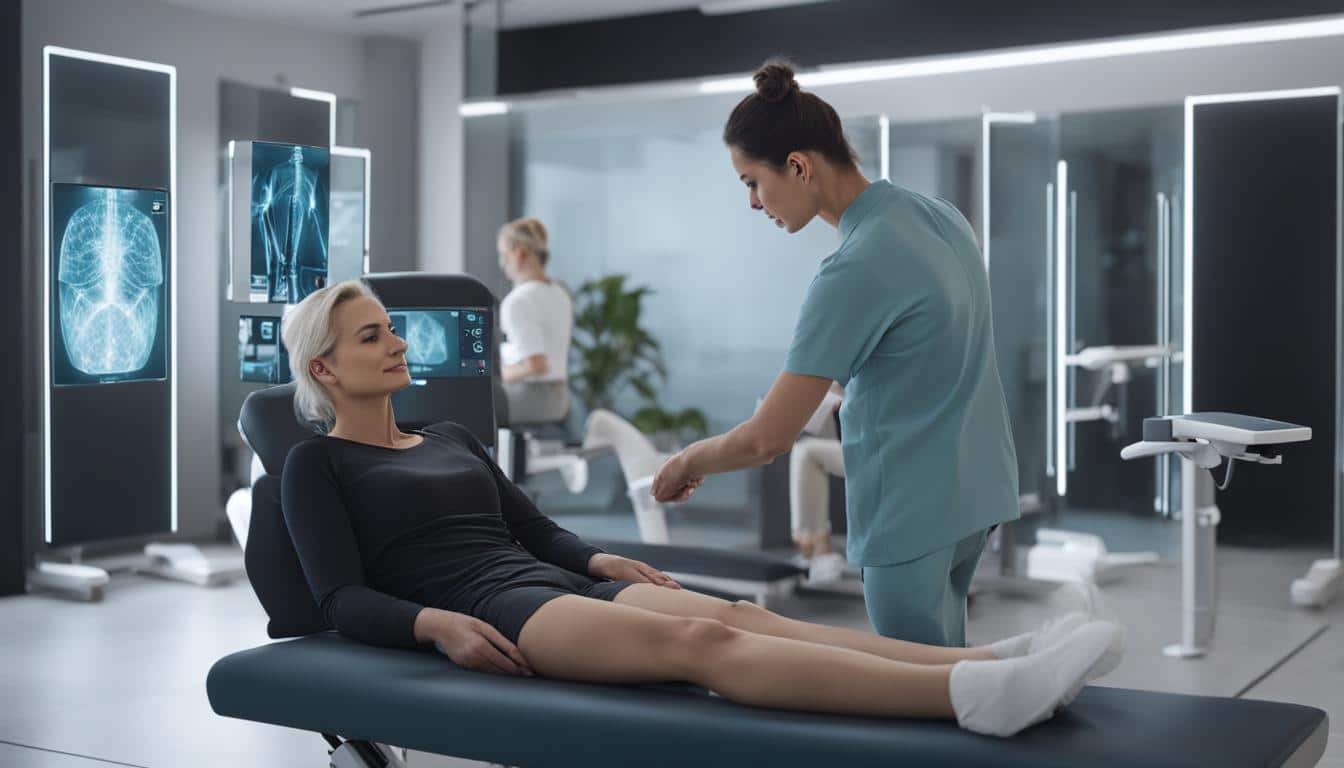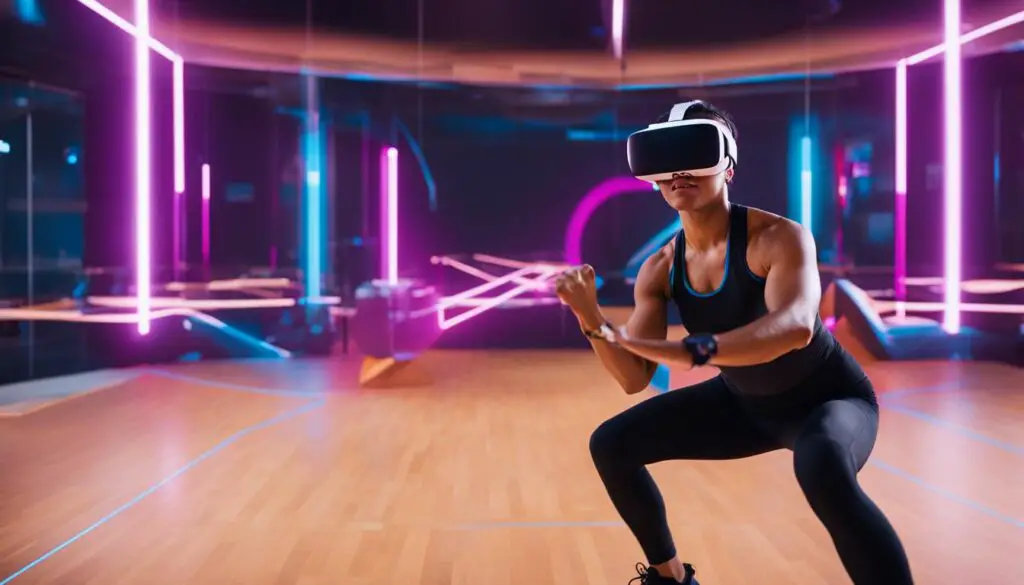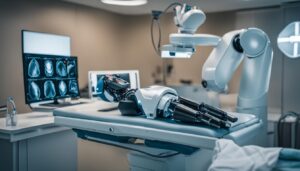
AI is revolutionizing the field of physiotherapy and rehabilitation, enhancing patient care and improving recovery outcomes with unprecedented precision and efficiency. The integration of artificial intelligence technologies in the healthcare industry holds great promise in optimizing treatment plans, personalizing therapy sessions, and monitoring patient progress. With advancements in AI, physiotherapists are able to provide more targeted interventions and deliver better outcomes for their patients. Let’s explore how AI is transforming the realm of physiotherapy and rehabilitation.
Key Takeaways:
- AI in physiotherapy and rehabilitation enhances patient care and improves recovery outcomes.
- Artificial intelligence technologies optimize treatment plans, personalize therapy sessions, and monitor patient progress.
- AI enables physiotherapists to provide targeted interventions and deliver better outcomes.
- Advancements in AI are reshaping the way physiotherapists deliver therapy and support to their patients.
- The future of physiotherapy and rehabilitation looks promising with AI as a powerful ally in improving patient outcomes.
The Role of AI in Personalizing Treatment Plans
One of the key benefits of AI in physiotherapy is its ability to personalize treatment plans based on individual patient characteristics and needs. AI algorithms can analyze vast amounts of patient data, from medical records to wearable device measurements, to identify patterns and trends that can inform therapy interventions. By considering factors such as age, medical history, injury type, and progress, AI can generate tailored treatment plans that optimize the effectiveness of physiotherapy interventions. This personalized approach allows physiotherapists to deliver targeted and individualized care to each patient, ultimately leading to better recovery outcomes.
Using AI algorithms for personalized treatment plans
AI algorithms play a critical role in the development of personalized treatment plans in physiotherapy. These algorithms have the capability to analyze large volumes of data, processing information that may be too complex for human analysis alone. By examining patient characteristics and data, such as medical records, imaging results, and wearable device measurements, AI algorithms can identify important patterns and trends that help inform physiotherapy interventions.
“AI algorithms can analyze vast amounts of patient data, from medical records to wearable device measurements, to identify patterns and trends that can inform therapy interventions.”
Considering patient characteristics for customized care
When generating personalized treatment plans, the AI algorithms take into account various patient characteristics. This includes factors such as age, medical history, injury type, and progress. By considering these individual characteristics, physiotherapists can develop treatment plans that are specific to each patient’s unique needs and goals. This personalized approach ensures that the therapy interventions are tailored to address the specific challenges and requirements of the individual, maximizing the effectiveness of the treatment.
“By considering factors such as age, medical history, injury type, and progress, AI can generate tailored treatment plans that optimize the effectiveness of physiotherapy interventions.”
Optimizing therapy interventions for better outcomes
With the help of AI, physiotherapists are able to optimize therapy interventions by leveraging personalized treatment plans. By utilizing AI algorithms, clinicians can identify the most effective and efficient interventions for each patient based on their unique characteristics and needs. This allows physiotherapists to deliver targeted and individualized care, maximizing the potential for better recovery outcomes. By tailoring the treatment to the specific requirements of the patient, AI enables physiotherapists to provide precision and efficiency in their therapy interventions.
“This personalized approach allows physiotherapists to deliver targeted and individualized care to each patient, ultimately leading to better recovery outcomes.”
In conclusion, AI plays a crucial role in the personalization of treatment plans in physiotherapy, leveraging data analysis and AI algorithms to consider patient characteristics and optimize therapy interventions. This personalized approach allows physiotherapists to deliver precise and efficient care, enhancing recovery outcomes for their patients.
AI-Enhanced Rehabilitation Devices and Robotics
AI-driven technology has revolutionized the development of rehabilitation devices and robotics, enhancing the capabilities of assistive devices and improving patient mobility and function.
Intelligent prosthetics and exoskeletons powered by AI algorithms are able to adapt and respond to a patient’s movements, providing customized support and assistance. These devices can analyze patient data in real-time and make adjustments to optimize performance, allowing individuals to regain independence and improve their quality of life.
Additionally, AI-powered robotics can facilitate repetitive and intensive therapy exercises, ensuring consistent and targeted rehabilitation efforts that accelerate recovery.
With AI-enhanced rehabilitation devices and robotics, patients can experience a new level of personalized care and support in their journey towards recovery. These advancements in AI-driven technology not only improve the functional outcomes of rehabilitation but also empower individuals to regain their mobility and independence.
AI-Based Virtual Reality for Rehabilitation
AI-based virtual reality (VR) is a cutting-edge technology that is revolutionizing the field of rehabilitation by creating immersive environments for motor learning and neuroplasticity. By combining AI algorithms with VR technology, physiotherapists can design personalized exercises and scenarios that simulate real-life movements and activities.
This immersive experience enhances patient engagement and motivation, leading to improved rehabilitation outcomes. AI algorithms continuously adapt and customize the virtual scenarios based on the patient’s performance and progress, ensuring that therapy sessions are challenging yet achievable. This innovative approach to rehabilitation has shown great potential in accelerating recovery and improving functional outcomes.
AI-driven virtual reality offers a unique way to harness the power of neuroplasticity, the brain’s ability to reorganize and form new neural connections. The immersive environments created by AI-based VR stimulate motor learning through repeated practice and targeted feedback, promoting the rewiring of neural pathways that are essential for functional recovery.
Benefits of AI-Based Virtual Reality in Rehabilitation
1. Enhanced Patient Engagement: The immersive nature of AI-based VR captivates patients’ attention and encourages active participation in therapy sessions. This increased engagement leads to greater adherence to treatment plans and better rehabilitation outcomes.
2. Personalized and Targeted Intervention: AI algorithms analyze patient data and customize virtual scenarios to match individual needs and abilities. This tailored approach ensures that therapy interventions are specific to each patient’s requirements, optimizing the effectiveness of rehabilitation.
3. Real-Time Performance Monitoring: Virtual reality environments powered by AI algorithms allow for real-time monitoring of patient performance and progress. This monitoring enables physiotherapists to make immediate adjustments, provide feedback, and track improvements accurately.
4. Motivational and Immersive Experience: AI-based VR provides an engaging and interactive experience that motivates patients to push their boundaries and achieve better results. By creating a sense of presence and realistic simulations, VR promotes motor learning and neuroplasticity.
5. Safe and Controlled Environment: AI-based VR allows experiments and practice in a safe and controlled environment. Patients can engage in activities that may otherwise pose risks in real-life settings, fostering confidence in their abilities and facilitating the rehabilitation process.

By harnessing the power of AI and virtual reality, physiotherapy and rehabilitation professionals can unlock new possibilities in the treatment and recovery of patients. The immersive environments and personalized interventions facilitated by AI-based VR have the potential to revolutionize rehabilitation outcomes and improve the lives of individuals undergoing therapy.
AI-Driven Monitoring and Tele-Rehabilitation
AI-driven monitoring and tele-rehabilitation are revolutionizing the delivery of physiotherapy services, providing patients with remote care and support. Through the power of AI algorithms, data from wearable devices, sensors, and video consultations can be analyzed to monitor patient progress and offer real-time feedback. This remote monitoring capability allows physiotherapists to track adherence to treatment plans, assess performance, and make timely adjustments to therapy interventions.
Tele-rehabilitation platforms, powered by AI algorithms, offer interactive exercise programs, personalized coaching, and remote support, ensuring continuity of care and improving access to rehabilitation services. This is especially beneficial for individuals facing geographical barriers or limited mobility, as they can now receive high-quality care from the comfort of their own homes.
The use of AI-driven monitoring in tele-rehabilitation provides numerous advantages. It allows patients to receive personalized and evidence-based treatment plans, ensuring that they adhere to the prescribed therapy interventions and achieve optimal recovery outcomes. The real-time feedback provided by AI algorithms enables continuous improvement and adjustments to treatment plans, maximizing the effectiveness of each session and promoting patient engagement.
Remote Patient Monitoring
Remote patient monitoring, made possible through AI-driven solutions, involves the collection and analysis of patient data from various sources. Wearable devices, such as fitness trackers or smartwatches, can gather vital information like heart rate, activity levels, and sleep patterns, enabling physiotherapists to monitor progress remotely. This real-time data allows clinicians to detect any changes, identify potential complications, and intervene promptly.
The integration of AI algorithms into remote patient monitoring systems enables intelligent analysis of patient data, recognizing patterns and trends that may be indicative of progress or setbacks. This automated analysis saves time and provides accurate insights, allowing physiotherapists to make well-informed clinical decisions promptly.
Real-Time Feedback
Real-time feedback is a crucial component of effective rehabilitation. It helps both patients and physiotherapists understand the impact of their actions, make necessary adjustments, and ensure adherence to treatment plans. AI algorithms play a significant role in providing real-time feedback, as they can interpret patient movements and actions to offer personalized guidance and corrections.
By leveraging sensor data and video consultations, AI algorithms can offer precise feedback on exercise technique, posture, and movement patterns. This enables patients to make immediate adjustments, improving the overall effectiveness of their therapy sessions. Real-time feedback also empowers patients to take an active role in their rehabilitation, enhancing their sense of ownership and motivation.

Overall, the integration of AI-driven monitoring and tele-rehabilitation brings tremendous value to the field of physiotherapy. Patients can now receive personalized care, track their progress, and make necessary adjustments under the guidance of their physiotherapist, all from the comfort of their own homes. With AI algorithms continuously advancing, the future of monitoring and tele-rehabilitation holds the promise of further improving adherence to treatment plans and enhancing recovery outcomes.
Conclusion
The integration of AI in physiotherapy and rehabilitation practices marks a groundbreaking advancement in patient care, offering precision, efficiency, and personalization like never before. From personalized treatment plans to AI-driven rehabilitation devices, virtual reality interventions, and remote monitoring, AI is reshaping the way physiotherapists deliver therapy and support to their patients.
The continuous development of AI technologies in the field holds immense potential for improving recovery outcomes, enhancing functional abilities, and ultimately transforming the lives of individuals undergoing rehabilitation. With AI’s ability to analyze vast amounts of data and generate targeted interventions, physiotherapists can provide tailored and individualized care, leading to better recovery outcomes.
As the AI revolution in healthcare continues to progress, the future of physiotherapy and rehabilitation looks promising, with AI as a powerful ally in improving patient outcomes. The seamless integration of AI in physiotherapy practices enables healthcare professionals to optimize treatment plans, monitor patient progress remotely, and deliver personalized therapy interventions. With AI’s precision and efficiency, physiotherapists can enhance patient care and empower individuals on their journey towards recovery and improved quality of life.
FAQ
How is AI revolutionizing the field of physiotherapy and rehabilitation?
AI is enhancing patient care and improving recovery outcomes with unprecedented precision and efficiency. It is optimizing treatment plans, personalizing therapy sessions, and monitoring patient progress.
What are the key benefits of AI in physiotherapy?
AI can personalize treatment plans based on individual patient characteristics and needs. It can analyze patient data to generate tailored treatment plans that optimize the effectiveness of physiotherapy interventions.
How is AI enhancing rehabilitation devices and robotics?
AI-driven technology has improved assistive devices and patient mobility. Intelligent prosthetics and exoskeletons powered by AI can adapt and respond to a patient’s movements, providing customized support and assistance.
How is AI transforming the field of rehabilitation through virtual reality?
AI-based virtual reality creates immersive environments for motor learning and neuroplasticity. Physiotherapists can design personalized exercises and scenarios that simulate real-life movements, enhancing patient engagement and motivation.
How is AI improving monitoring and tele-rehabilitation in physiotherapy?
AI algorithms analyze data from wearable devices, sensors, and video consultations to monitor patient progress and provide real-time feedback. Tele-rehabilitation platforms powered by AI offer interactive exercise programs and personalized coaching.
What is the potential of AI in physiotherapy and rehabilitation?
The integration of AI in physiotherapy practices offers precision, efficiency, and personalization. It has the potential to improve recovery outcomes, enhance functional abilities, and transform the lives of individuals undergoing rehabilitation.
Source Links
- https://ai2.news/2024/01/09/intuition-robotics-is-giving-its-social-bot-a-generative-ai-upgrade-and-it-makes-so-much-sense/
- https://ai2.news/2024/01/09/warren-buffetts-biggest-ai-bets-in-2024-47-2-of-berkshire-hathaways-358-billion-stock-portfolio-is-in-these-3-artificial-intelligence-stocks/
- https://ai2.news/2024/01/09/gatik-autonomous-trucks-know-the-road-via-goodyears-smart-tires/








